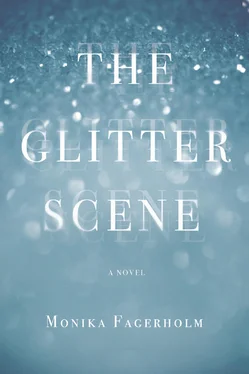“Confession.” The mother, during Susette’s childhood, at the cemetery, smiles a bit hesitantly. Susette thinks “confession” is a beautiful word and when Majjunn is out of earshot Susette wants her mother to explain what it means. Her mother has not felt like it, you can see it on her, it has made her feel ill at ease. Standing between the graves in office clothes—she works at the bank otherwise but lost her father in the war; she is of the generation that death for her has become at once a self-evident and vile thing—and hesitates for a few seconds. Then she laughs and whistles softly, almost a sharp whistle of the kind Susette’s much older brother struggled to teach her when they were children at home in the house in the town center. And the mother shouts, with an almost endless tenderness in her voice:
“But what beautiful flowers you have in your bouquet, Susette.”
Not: “What a cute little Angel of Death,” which Majjunn later, when the mother is out of earshot, comes there to whisper in Susette’s ear.
Or: God likes the small, timid and defenseless . Which she says sometimes when she suddenly appears at the water hydrant in the stone grove when Susette has gone there on her own to fill the glass jars with water.
The mask on: “It’s not a movie star, it’s the Angel of Death Liz Maalamaa, aren’t you afraid of her?”
Susette busy with the water, the jars, shakes her head as if to ward it off.
•
“I don’t want to play with her,” Susette says to her mother when at some point her mother admonishes her and says, “You need to be nice to the little girl, maybe she’s lonely.”
“Don’t want to.” Susette sulks.
“But she is right about one thing,” her mother continues, maybe pretending not to listen to her daughter, “some words really do sound beautiful here. Ringing the church bells for the weekend service, for example. Words like ‘ringing church bells’ I particularly, especially love.”
But then later she adds in a somewhat softer voice:
“But I understand, Susette. You don’t have to play with her if you don’t want to.”
•
But nothing more about that either. And that is okay too, perfectly normal. Because going to the cemetery and placing flowers on the Graves of the Forgotten is, as said, something Susette and her mother have a habit of doing, just because, when they are together. That is to say: there is nothing about it that is great or fatefully filled with meaning. A ritual in twosomeness that is only theirs sometimes, in the family. Nor was it a twosome fellowship, in the sense of excluding everyone and everything else.
Like cutting up old clothes and rags to take them to get woven into rugs by a woman they know with a loom. A real rug weaver, she lives outside the town center, somewhere far far away in the Outer Marsh. She is old too, probably has twenty cats, lives in a drafty old shack of a cottage, where it smells of cat piss and the loom is rigged up, almost always in motion, in the only room. It is big too, takes up almost all of the floor space. And, rather new: the Bankers’ Employee Club, where Susette’s mother is a secretary and very active, has bought it for her with money they earned by organizing bazaars and lotteries, and selling baked goods to each other, that sort of thing.
Beautiful rag rugs are produced, with many colors, beautiful patterns: the woman then sells them at the square or via the bankers’ network and she can almost live off of it.
So, as said: in other words it is one other thing Susette and her mother tend to occupy themselves with in the evenings sometimes in the house in the midst of family life. Cutting up old rags, clothes, towels, their own or ones they have received from neighbors or others, sometimes they ask for them in the surrounding neighborhoods, go from door to door.
In the kitchen in the house or in the living room in front of the television. Just because, in other words not anything significant. Maybe you can describe it like this: that it is Susette and her mother partially in their own world that still, while Susette is a child, consists of so much more, so many other people too. There are, which has already been mentioned, two brothers almost ten years older who settle down somewhere else after finishing school; move away from the District in order to start families and work in another area. And the father of course who later, due to his work, is forced to be gone quite a lot. He is a doctor of engineering and receives an assistant professorship at a college in a city located rather far away in the eastern part of the country—and because of the distance and the expensive travel he comes home only on weekends and holidays. In other words, his profession is not that of a sea captain, which Susette likes to say at some point in school when someone asks her what her father does: but later, when Susette is in her early teens, he becomes ill, he spends a lot of time in the hospital. Not in the local hospital but in a larger hospital in the city by the sea, it is that serious. He passes away and a few years later her mother passes away: is hit with a massive heart attack and drops to the ground in the house in her own kitchen where she so enjoyed being.
But then, when it happens, Susette Packlén is already grown up and not there.
It is Maj-Gun who tells her how it happened. Maj-Gun Maalamaa, she knows everything. Has been living upstairs in the house as a boarder in the guest room for almost a year and a half already by the time Susette comes back after having been gone for three years.
Maj-Gun explains that her father, the Pastor, has during that time received a position in another parish, and she did not want to move with her parents to the new rectory. She explains to Susette that she has realized that despite everything she likes it in this municipality; and besides, she also had to prepare for all of the admission interviews and application interviews for the university. So therefore, and for practical reasons too, staying in the District has been a better alternative. And Maj-Gun has furnished a real attic study for herself in the guest room in Susette’s absence: thick tomes of paper and compendiums lie in piles, drifts of paper on the desk and in the bookshelves.
And to support herself while studying for her interviews she has, in other words for a while now, started working full-time shifts at the newsstand at the square in the town center.
Susette has, as said, at this point in time been gone for almost three years; she has just turned twenty. “In Poland,” that is what it is called, has been called, and will still be called. With her second love, but it came to nothing. And due to the poor telephone connections, the poor postal service, and poor communication in general… Susette has come home only when it has been too late. On the whole she gets to hear what happened when it is too late.
Maj-Gun Maalamaa is the one who meets her at the ferry terminal as they had agreed by telephone. “What a nice backpack, Fjällräven—” Maj-Gun spells out. “Is it new?”
Thick plastic bags filled with rug rags remain everywhere in the house, in piles on top of each other too along the walls in the kitchen (the old woman with the loom in the Outer Marsh has been dead for a long time already).
“What we did toward the end?” Maj-Gun stood there in the middle of the mess and the musty smell and asked herself rhetorically. “Cut. Rug rags. It was a calm and restful hobby.”
“She was terrified of dying,” says Susette.
“You can rest assured, Susette,” Maj-Gun replies, “it was over in a few minutes. I called the ambulance. But it was too late.”
“Can love make you crazy, can grief make you crazy, can regret, can—” Susette asks, no, whispers, because it can barely be heard. And her stomach hurts so badly, so damned much, as if her body is in the process of being cut in two, and her legs that collapse under her; then she has to go to bed and sleep, rest—remains bedridden for several days.
Читать дальше











